
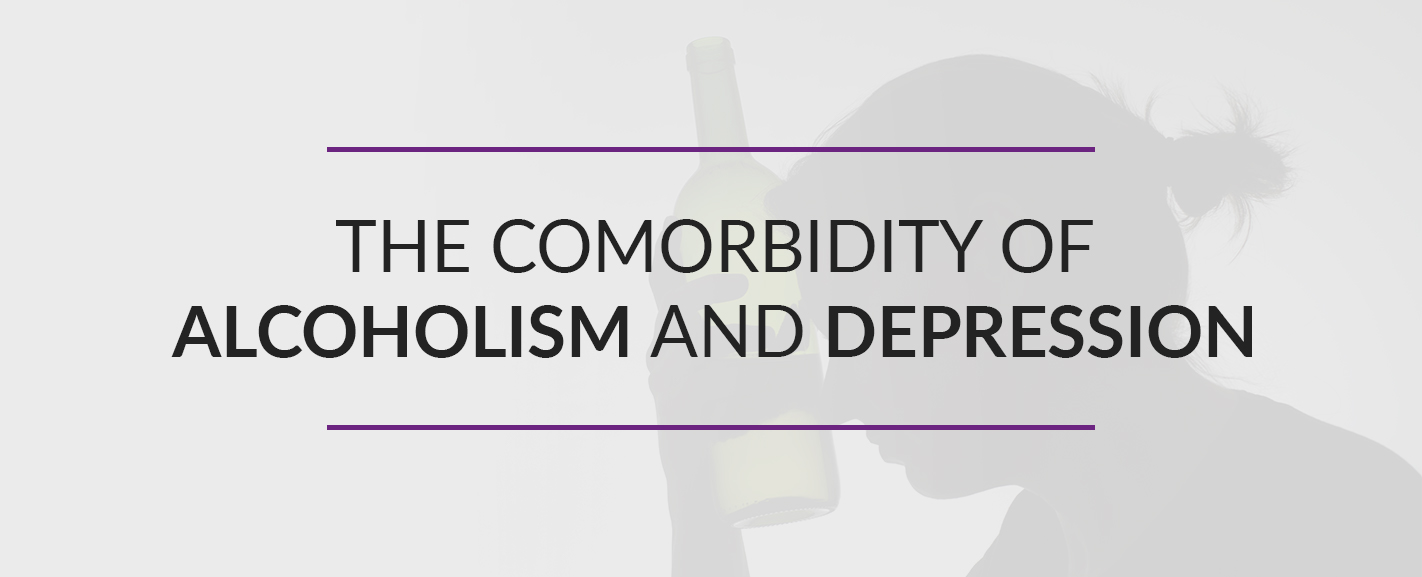
Content medically reviewed by Vicky Magobet, PMHNP-BC, on August 13, 2021.
Substance addiction comes with a variety of distressing and destructive health risks. One of these risks is the comorbidity of alcoholism — also known as alcohol use disorder (AUD) — and depression. There are many reasons why these disorders occur simultaneously. When paired together, AUD and depression can cause interrelated problems that are challenging to address separately. If you're experiencing mental disorders comorbidly with alcoholism, it's helpful to understand why and how this happens as you take steps toward recovery.
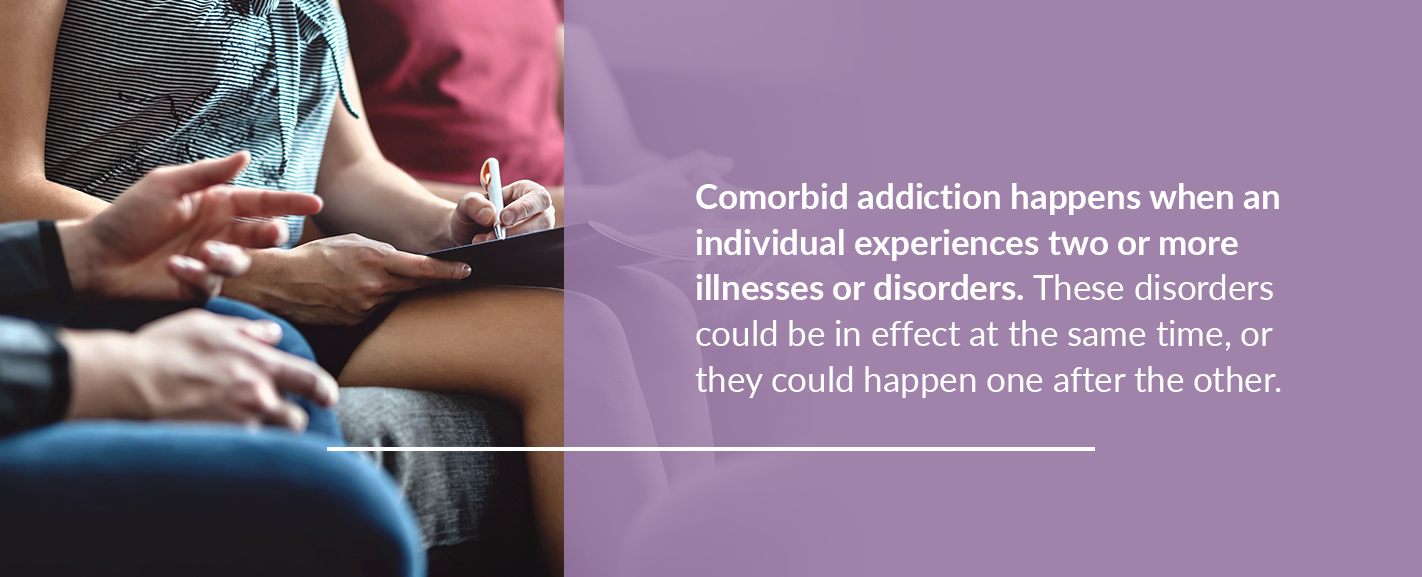
Comorbid addiction happens when an individual experiences two or more illnesses or disorders. In the context of addiction, comorbidity refers to instances where addiction and mental illness coexist. These disorders could be in effect at the same time, or they could happen one after the other. Regardless of how they begin, comorbid disorders often interact in ways that worsen the effects of each disorder.
You may hear the terms "comorbid" and "co-occurrence" used interchangeably when talking about AUD and depression. Though comorbid and co-occurrence have similar meanings in a broad sense, comorbid can refer to any two coexisting conditions — like cancer and generalized anxiety disorder. Co-occurrence tends to be used exclusively to reference addiction and mental illness.
According to the National Institute on Drug Abuse, comorbidity between AUD and depression is fairly common. In fact, about 50% of those who struggle with mental illness will deal with a substance use disorder at some point in their life. Comorbid addiction and mental illness can feel complex, and it often has nuanced beginnings.
In some cases, depression may lead to excessive drinking. Those who experience major depressive disorder or other mood disorders deal with difficult symptoms, including:
Depression symptoms can be hard to cope with. Without healthy coping mechanisms, an individual may turn to alcohol for the burst of energy and respite it provides. They may find temporary relief from their depression and anxiety symptoms when drinking, which may lead to increased or excessive drinking.
There are a few mental and biological factors that drive the progression from depression to AUD, including:
Plus, depression can cause brain changes that make alcohol seem more rewarding. Depression impacts the amygdala, thalamus and hippocampus. Each of these areas supports a different type of brain function and well-being:
Each case of comorbid depression and AUD results from a different combination of biological and environmental factors. Some drugs or medications can make mental illness symptoms worse, which can fuel comorbidity.
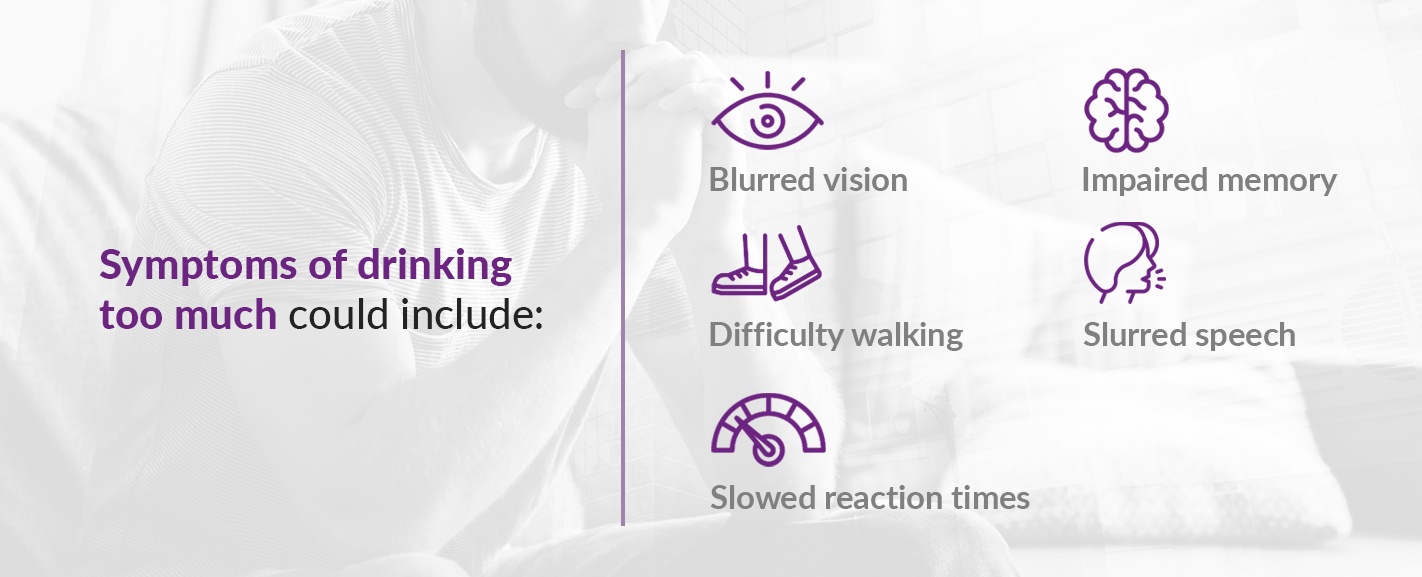
When substance use alters an individual's brain, they may be more susceptible to mental illnesses like depression. You likely notice the short-term effects of alcohol consumption after a few drinks. These symptoms could include:
Alcohol's long-term effects are more serious and lasting. Heavy drinking may lead to the following:
Alcohol is classified as a depressant, which means it affects the central nervous system to cause sedation and drowsiness. Experiencing alcohol's natural depressing effects may strengthen the impact of major depressive episodes.
Alcohol's effects also extend beyond the body. When an individual consumes alcohol, they may be more likely to make poor decisions that could have distressing consequences — like losing a job, ending a relationship, becoming injured or straining finances. These consequences could lead to depression or compound the effects of existing depression.
According to the National Institute on Alcohol Abuse and Alcoholism, 27.2% of people with AUD had a comorbid major depressive disorder. Some common comorbid psychiatric disorders include:
Excessive drinking could lead to one of these disorders, or the issue could surface after recovery. Either way, the disorders are considered comorbid if they are tied to each other in some way.
It can be difficult to pinpoint why comorbid addiction happens and how each disorder fuels the other. Research has identified a few key reasons why AUD and depression may coexist, including genetics and environmental factors:
Your genetic makeup dictates many of your physical and personality traits. Though genes are not wholly responsible for who you become, they play a foundational role in shaping your body and mind. Research points to a connection between your genetic makeup and your risk for alcohol dependence and psychiatric disorders.
According to a recent study, the gene called ADH1B may influence your comorbidity risk. This gene regulates how the body turns alcohol into the substance acetaldehyde — which feels unpleasant in the body and helps discourage people from overdrinking. Some individuals have a variant of the ADH1B gene that makes the alcohol-to-acetaldehyde conversion quicker, typically cutting off the overindulging faster with bodily symptoms. The research also found that the genetic factors related to AUD were linked to risk factors for psychiatric disorders.
The genes you've received are an unchangeable part of you. Some genes may be expressed according to your lifestyle and environment, which you may be able to influence to some degree.
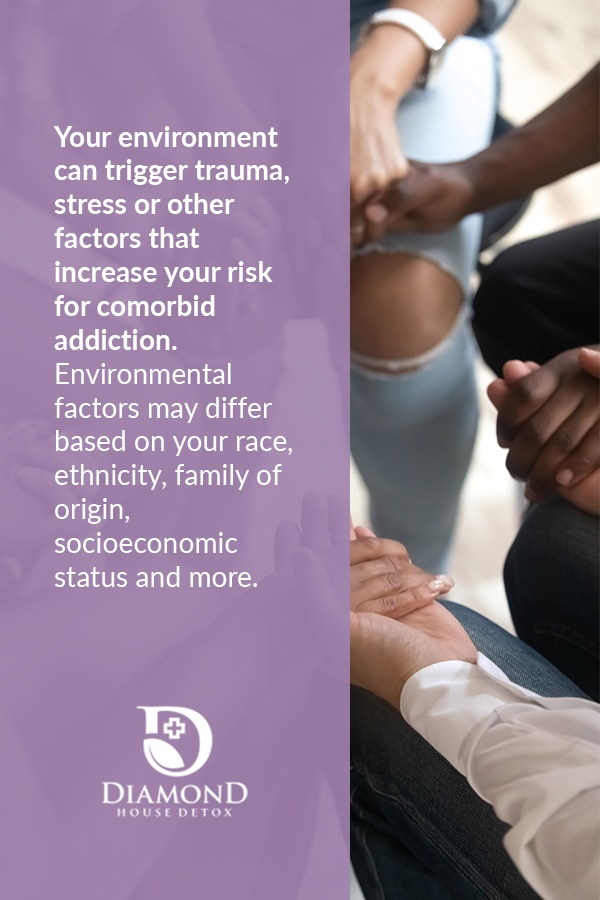
Your environment can trigger trauma, stress or other factors that increase your risk for comorbid addiction. Environmental factors may differ based on your race, ethnicity, family of origin, socioeconomic status and more. According to research, environmental factors for AUD may impact racial and ethnic minorities at a disproportionate rate. Some of these factors include:
The environmental factors for depression differ from those for AUD. Some of the lifestyle risk factors for depression include:
Depression risk factors may stem naturally from many of the AUD risks. For example, those with convenient alcohol availability may be more likely to develop a substance use disorder that leads to depression. Those at a socioeconomic disadvantage may be more likely to have a poor diet and chronic health issues from lack of access to good food and healthcare.
This interplay is quite complicated. Having certain genetics and environmental factors doesn't always lead to comorbidity or addiction. When comorbidity does happen, each disorder can contribute to the overall issue in different ways, depending on whether the major depressive disorder happened before or after the AUD began. Alcohol addiction itself is considered a mental health disorder, which blurs the lines of comorbid AUD and depression.
Even if one disorder surfaces first, it can be difficult to determine if it caused the second disorder in comorbid addiction. In some cases, it may be impossible to establish which disorder came first. Whether your depression started first and led to AUD or your AUD brought on depression, your treatment needs are similar. With a dual diagnosis, it's important to address both disorders during treatment. You're not dealing with isolated depression or AUD — the two are interwoven and can worsen each other in ways that may not be addressed with depression-focused or AUD-focused treatment.
If you're experiencing comorbid AUD and depression, inpatient treatment can offer the recovery and healing you're searching for. At Diamond House Detox, we offer residential dual diagnosis treatment to address co-occurring addiction and mental illness. When you begin a treatment program, you'll work with experienced professionals to establish a history of your AUD and depression. This may include determining:
Once a professional understands your unique situation, they can develop a treatment plan with the appropriate therapy, detoxification and medication.
Your treatment will be tailored to your needs and may consist of the following components:
When you choose Diamond House Detox, you can enjoy an intimate and private setting for treatment. Our clients receive freshly prepared meals, 24/7 care, holistic treatment and incidental medical services to help them heal and grow as a whole person.
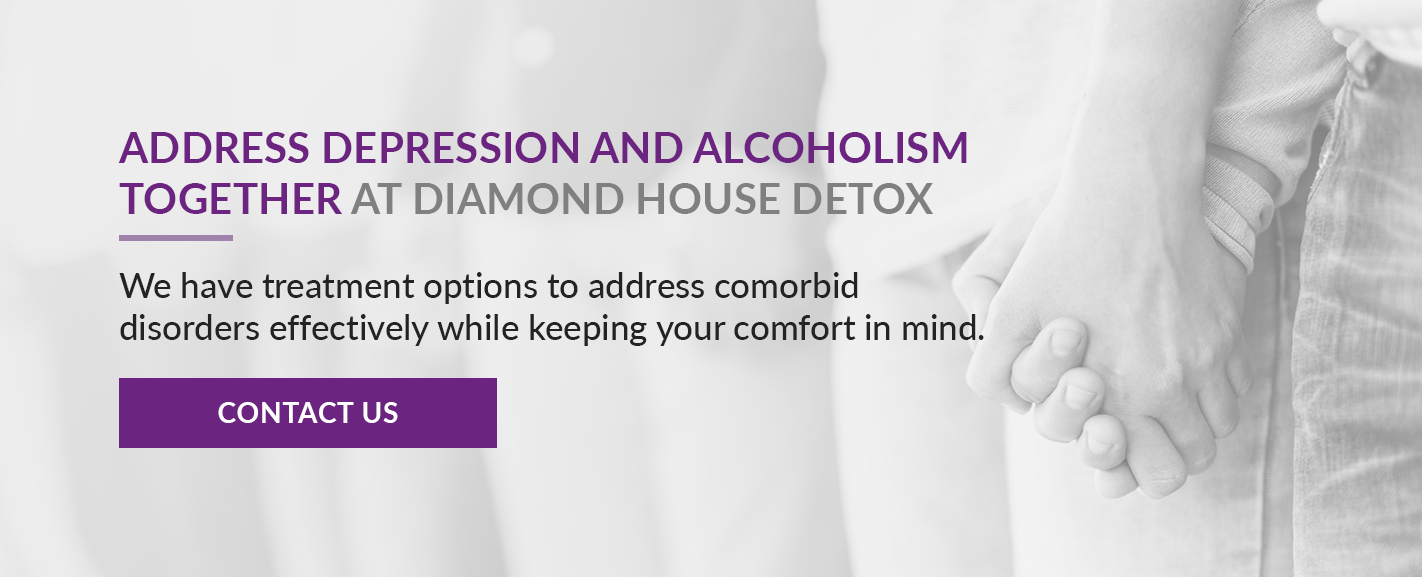
If you're looking for a residential recovery program in northern California, Diamond House Detox is here to help. We have treatment options to address comorbid disorders effectively while keeping your comfort in mind. We understand that peace and privacy are important during your detox, which is why you'll enjoy your own room and a relaxing environment at Diamond House Detox. We work hard to maintain a personal setting and provide individualized care.
For more information about your treatment options and admission, contact us today.
Sources:
3. https://www.webmd.com/depression/guide/alcohol-and-depresssion#1
4. https://adaa.org/understanding-anxiety/depression/symptoms
5. https://www.healthline.com/health/mental-health/alcohol-and-depression#coexisting
6. https://www.health.harvard.edu/mind-and-mood/what-causes-depression
7. https://pubs.niaaa.nih.gov/publications/aa63/aa63.htm
8. https://www.ncbi.nlm.nih.gov/books/NBK20360/
9. https://pubs.niaaa.nih.gov/publications/arh26-2/81-89.htm
10. https://www.sciencedaily.com/releases/2018/11/181126123328.htm
11. https://www.ncbi.nlm.nih.gov/pmc/articles/PMC5695556/
12. https://www.mentalhelp.net/depression/environmental-causes/
13. https://diamondhousedetox.com/drug-addiction-mental-illness/
14. https://medlineplus.gov/dualdiagnosis.html
16. https://www.ncbi.nlm.nih.gov/pmc/articles/PMC1089782/
17. https://diamondhousedetox.com/addiction-treatment/alcohol-detox-and-rehab-program-in-sacramento-ca/
18. https://diamondhousedetox.com/why-choose-diamond-house/medical-detox-assistance/
19. https://diamondhousedetox.com/addiction-therapy/cognitive-behavioral-therapy/
20. https://diamondhousedetox.com/addiction-therapy/trauma-therapy/
21. https://diamondhousedetox.com/how-single-event-trauma-can-lead-to-addiction/
22. https://diamondhousedetox.com/addiction-therapy/emdr-therapy/
23. https://diamondhousedetox.com/what-sets-us-apart/
24. https://diamondhousedetox.com/about-us/service-areas/
25. https://diamondhousedetox.com/why-choose-diamond-house/
26. https://diamondhousedetox.com/contact-us/